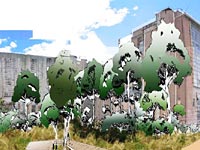Landscape Architecture - 3380
This Program is no longer accepting new enrolments
Program Summary
Faculty: Built Environment
Contact: Built Environment
Campus: Sydney
Career: Undergraduate
Typical UOC Per Semester: 24
Min UOC Per Semester: 6
Max UOC Per Semester: 24
Min UOC For Award: 192
Domestic Entry Requirements: See Domestic Entry Requirements
International Entry Requirements: See International Entry Requirements
Award(s):
Bachelor of Landscape Architecture (Major)
View program information for previous years
Program Description
The Bachelor of Landscape Architecture degree provides academic education and practical experience leading to professional qualifications in landscape architecture. It requires full time attendance for four years plus work experience that must be completed prior to graduation. For students unable to undertake full-time study, the Program Director may negotiate a part-time study schedule to enable students to complete the program over a longer period.
The program seeks the synthesis of knowledge and skills through project based learning in a sequence of eight Design Studios. Design projects are related to the subject matter of concurrent courses and culminate in an independent design study of regional and national significance. Lectures and practical semesters cover theoretical knowledge in the following areas:
Landscape Architectural Design
Design Communications
Landscape Architectural History and Theory
Landscape Architectural Technology
Natural and Cultural Systems
Professional Practice
Program Objectives and Graduate Attributes
Program Structure
Semester 1
- LAND1141 Design Communication 1 (6 UOC)
- LAND2101 Landscape Studio 1 (6 UOC)
- LAND2121 Intro to Landscape Arch (6 UOC)
- LAND2151 Landscape Analysis (6 UOC)
- LAND2102 Landscape Studio 2 (6 UOC)
- LAND2122 History of Landscape Arch (6 UOC)
- LAND2142 Design Communication 2 (6 UOC)
- LAND2152 Plants, Design & Ecology (6 UOC)
Semester 1
- LAND2201 Landscape Studio 3 (6 UOC)
- LAND2251 Planting Design (6 UOC)
- LAND2271 Landscape Documentation (6 UOC)
- General Education (6 UOC)
- Select Elective* (6 UOC)
- General Education (6 UOC)
Semester 1
- LAND1351 Landscape Management (6 UOC)
- LAND2301 Landscape Studio 5 (12 UOC)
- Interdisciplinary Learning Course** (6 UOC)
- LAND1322 Urban Landscape Design Seminar (6 UOC)
- LAND2302 Landscape Studio 6 (12 UOC)
- Interdisciplinary Learning Course** (6 UOC)
Semester 1
- LAND2401 Landscape Studio 7 (12 UOC)
- LAND2421 Contemporary Theory & Research (6 UOC)
- Open Elective (6 UOC)
- LAND1421 Thesis Foundation (6 UOC)
- LAND1482 Professional Practice (6 UOC)
- LAND2402 Landscape Studio 8 (12 UOC)
- Open Elective (6 UOC)
- LAND1422 Landscape Thesis (6 UOC)
Additionally, students are not required to undertake the other elective and general educaton requirements in the exact order as indicated in the above program structure. This structure provides a suggested order for the completion of these elective and general education requirements, however a student can choose to do them in a different sequence. For example, a student may choose to complete an open elective in S2 of Yr 2 and undertake the 6 UOC of general education in Yr 4.
A list of 2015 Interdisciplinary Learning Courses is below:
Summer Semester:
- BEIL0017 Business Start Up (6 UOC)
- BEIL6000 Issues in Urbanism (6 UOC)
- BEIL6003 Cinematic Space (6 UOC)
- BEIL0001 Graphic Design for Built Env (6 UOC)
- BEIL0005 People, Place and Design (6 UOC)
- BEIL0007 Sustainable Design Thinking (6 UOC)
- BEIL0010 Creating Value for Built Env (6 UOC)
- BEIL0011 Healthy Planning (6 UOC)
- BEIL0013 Architectural Photography (6 UOC)
- BEIL0014 Digital Making (6 UOC)
- BEIL0016 Renewing the Urban Environment (6 UOC)
- BEIL6002 Urban and Regional Planning (6 UOC)
- BEIL6004 Classical Architecture (6 UOC)
- BEIL6005 Art, Architecture and Design (6 UOC)
- BEIL0001 Graphic Design for Built Env (6 UOC)
- BEIL0003 BE Annual Design Competition (6 UOC)
- BEIL0005 People, Place and Design (6 UOC)
- BEIL0006 BE OutThere Elective (6 UOC)
- BEIL0008 Vision to Reality (6 UOC)
- BEIL0009 Exhibition Design (6 UOC)
- BEIL0013 Architectural Photography (6 UOC)
- BEIL0015 Digital Design Foundations (6 UOC)
- BEIL6001 International Planning (6 UOC)
- BEIL6006 Heritage Planning (6 UOC)
Honours
Academic Rules
2. To fulfill these requirements, students must complete:
- 150 units of core courses, being all those prescribed in the Faculty regulations for this program
- 6 units of select electives taken from Landscape elective list
- 12 UOC of FBE Electives from the list of Interdisciplinary Learning Courses (see list above)
- 12 units of open (free) electives, selected in accordance with the Faculty regulations for undergraduate study in the Faculty of the Built Environment (see below)or LAND1421 Thesis Foundation and LAND1422 Landscape Thesis
- 12 units of General Education courses in accordance with University requirements (see below)
4. There is an option in Year 4 to undertake a thesis. This specialised and independent study, allows students to gain or extend their in depth knowledge and understanding of a particular aspect of landscape architecture. Students may substitute the thesis (LAND1421 and 1422) for 12 uoc of open elective credit. To qualify for the thesis, students must have an overall WAM of 70 and submit an application to the Program Director by the end of Year 3. The thesis is approximately 12,000 words in length. Each student conducts the required research, organization of material and writing under the guidance of their supervisor.
5. A Progress Portfolio must be submitted at the end of year 3 as part of LAND2302 which will determine progression into the final year of design.
6. Design Studios are considered to be a linear sequence, which requires that each design studio must be passed before a student can advance to the next level.
The exception being specific General Education GEN prefix course/s which cannot be counted as open elective. Open elective do not need to be taken outside the Faculty, students can choose FBE electives as open electives.
Fees
Professional Recognition
Area(s) of Specialisation









